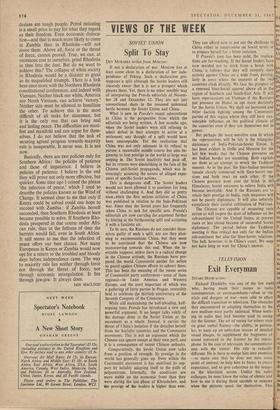VIEWS OF THE WEEK
SOVIET UNION
Split To Stay
DEV MURARKA writes from Moscow:
If not a declaration of war, Moscow has at least come close to a declaration of her inde- pendence of Peking. Such a declaration pre- supposes a split although the Soviet leaders still sincerely swear that it is not a prospect which
pleases them. Yet, there is no other sensible way of interpreting the Pravda editorials of Novem- ber 28 and December 12. They are not just conventional shots in the resumed polemical battle between the Soviet Union and China.
What is new in Pravda's recent admonitions to China is the perspective from which the editorials are being written. A few months ago, when the Soviet leaders were still refusing to admit defeat in their attempts to arrive at a settlement, any thought of a split would have been unacceptable. Yet the realisation that' China was not only adamant in its refusal to pursue a reasonable middle course but also be- ginning to lose prestige in the world at large was seeping in. The Soviet inactivity had paid off, but its returns were diminishing in the face of the Chinese anti-Soviet propaganda, which was in- creasingly assuming the nature of alleged expo- sures of specific Soviet actions.
This is dangerous stuff. The Soviet leaders would not have allowed it to continue for long without challenging it. And they did so pretty soon .when the first serious criticism of China was published in relation to the Indo-Pakistani war. Since then the Soviet press has frequently taken China to task for specific acts. Pravda's editorials are now carrying the argument further by hinting at the forthcoming split and accepting it with a fatalistic air.
To be sure, the Russians do not consider them- selves guilty of such a split, nor are they plan- ning to excommunicate China, but they seem to be convinced that the Chinese are now manoeuvring towards this end. When the in- evitable happens, unless there is a radical change in the Chinese attitude, the Russians have pre- pared the world Communist parties for action to guard against Chinese efforts to subvert them. This has been the meaning of the recent series of Communist party conferences—some of them regional—in Latin America and Western Europe, and the most important of which was a gathering of forty parties in Prague, ostensibly held to celebrate the thirtieth anniversary of the Seventh Congress of the Comintern.
While still maintaining the half-pleading, half- arguing tone. Pravda has introduced a new and powerful argument. It no longer talks solely of
the damage done to the Soviet Union or the movement as a whole. Instead, it carries the threat of China's isolation if she detaches herself from the Socialist countries and the Communist movement. This is not an argument which the Chinese can ignore except at their own peril, and
it is a consequence of recent Chinese setbacks. Comparatively, the Soviet Union now talks from a position of strength. Its prestige in the
world has generally gone up. Even within the Communist movement it has stabilised its sup- port by suitably adapting itself to the pulls of
polycentrism. Internally, the conditions are more stable on the economic front than they were during the last phase of Khrushchev, and the prestige of the leaders is higher than ever.
They can afford now to put out the challenge to China either to compromise on Soviet terms or to prepare herself for a bitter isolation.
If Pravda's tone has been mild, the implica- tions are far-reaching. If the Soviet leaders have now decided not to shirk from a break with China, it follows that they will intensify their activity against China on a wide front, particu- larly in areas where the interests of the two countries clash directly. We face the prospect of a renewed Sino-Soviet quarrel above all in the region of Southern and South-East Asia. It will have repercussions on Vietnam if the Russians put pressure on Hanoi to opt more decisively for the Soviet Union. We shall see increased and bitter faction lighting among the Communist parties of this region where they still have con- siderable influence on the political climate of the countries even if they are themselves not in power.
But perhaps the most-sensitive area in which the repercussions will be felt is the triangular diplomacy of India-Pakistan-Soviet Union. It has been evident in Delhi and Moscow for the last few weeks that the Chinese pressures on the Indian border are mounting. Both capitals see them as an attempt to wreck the Tashkent summit. As in the past, the Sino-Indian tensions remain closely connected with Sino-Soviet ten- sions and both react on each other. If the Chinese pressure went over the brink in thi) Himalayas, Soviet measures to relieve India will become inevitable. And if the Russians are to retain their prestige in India, such measures will not be purely diplomatic. It will also infinitely complicate their careful cultivation of Pakistan.
The Chinese are capable of mounting such action as will reopen the door of influence on the sub-continent for the United States, at present more or less closed because of successful Soviet diplomacy. The period before the Tashkent meeting is thus critical not only for the Indian sub-continent but also for Sino-Soviet relations. The ball, however, is in China's court. We may not have long to wait for China's answer.
















 Previous page
Previous page